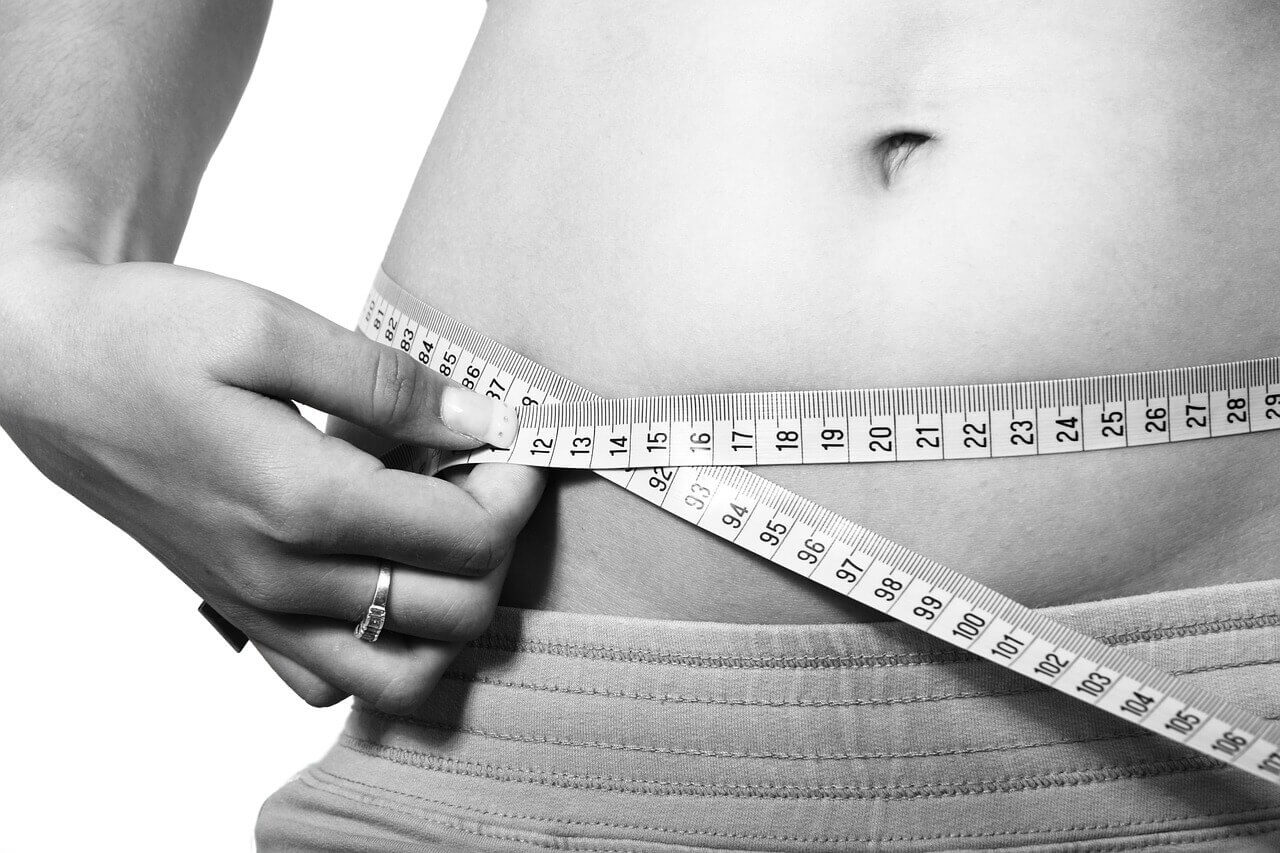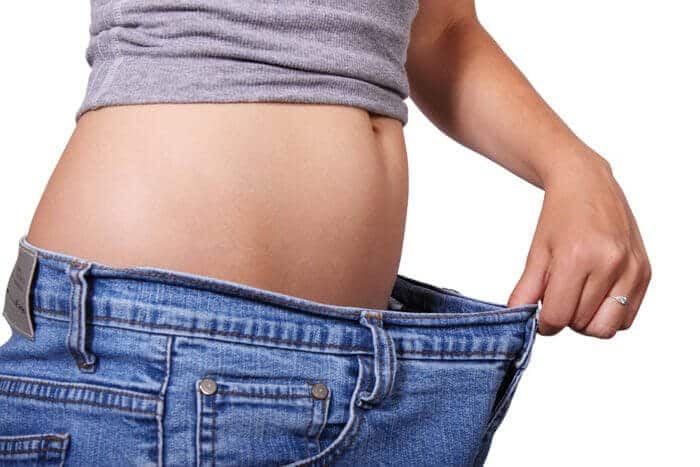Today I’m sharing the best wellness tips and mistakes to avoid. We dive into the research to determine how water retention, hormones, diet and other scale tipping factors play into your daily weight.
In an increasingly wired world, we have become obsessed with the need for self-knowledge, especially when it comes to our personal health. But even as technology becomes increasingly sophisticated, there are some “wellness tips” that remain decidedly basic: the original self-metric, weighing ourselves.

When you weigh yourself, the number on the scale often becomes a statement of self-worth- a badge of honour for some, and a symbol of self-loathing for others. Even with a greater understanding of whole-body health, with a strong focus on fitness and nutrition, how much weight we give our weight remains a point of contention.
The Big Question: Should you weigh yourself daily?
One of my top wellness tips is knowing that weight alone is not an indicator of health and fitness. A single number does not reflect your body composition- how much lean muscle you have or how much fat you have. It doesn’t reflect your new squat max (and how good your booty looks in those jeans), or how many seconds you crushed off your 5K this morning. It doesn’t reflect how many flights of stairs you can carry five bags of groceries with a kid on your back. It also definitely does not reflect your self worth.

Muscle Causes Weight Gain
A better indicator of health than just weight alone is body composition. Body composition can be described as the amount of lean muscle mass compared to the amount of body fat you have, and how it is distributed. It tends to be a much better predictor of your health status compared to weight alone. Increasing your lean muscle mass, while also reducing the amount of fat in your body (especially around your mid-section) has a number of well-studied benefits: better weight maintenance due to more calories burned to maintain muscle, increased strength, and less risk of injury. Just remember, gaining muscle is going to show on the scale too, as muscle weighs more than fat mass.
Another measurement you may of heard of is BMI or Body Mass Index. BMI compares your weight to your height, and then categorizes that value between underweight and severely obese. Even this method for predicting health can be misleading, as only overall weight is considered, and not lean muscle mass. Based on BMI alone, many athletes are deemed to be “obese”, despite being metabolically healthy. If that doesn’t convince you not to weigh yourself daily, keep reading on.
Water Causes Weight Gain
Despite what most fitness magazines will tell you, your body composition doesn’t change overnight. So no, that decadent dinner (with the drinks and dessert) doesn’t immediately convert itself to fat on your thighs. Repeat with me: fat loss and fluid loss are not the same. It turns out your weight fluctuates frequently over the period of a day, which is why we don’t recommend you weigh yourself daily. Your eating habits, exercise regime, fluid intake, bathroom regimen, hormone balance and medication list will influence how your body retains fluid. Let’s look at how all of these factors influence the number on the scale.
Carbs
Carbohydrate intake can have a two-fold effect on water retention, which you would see if you weighed yourself daily. Carbs are stored in our muscles as a special form called glycogen, where for every 1g of glycogen you store 2-3g of water along with it- weight you will definitely see on the scale. The reversal of this is common with low carb diets, which wellness tips seem to recommend frequently. As your body uses up all the carbohydrate reserves in your muscles, all the water bound along with it is also released. Voila, quick weight loss overnight! But is that weight loss fat loss? Nope- it takes more than that.
Salt
When you eat a meal high in salt (sodium), the sodium in your blood temporarily increases too. Water is pulled into your blood from your cells to balance the excess salt, and your cells become slightly dehydrated. Now that you’re thirsty, any water you drink will be retained to help reestablish a normal blood balance. You may see physical symptoms, like swollen hands and feet, and bloating. And you will definitely see a difference on the scale if you weigh yourself daily.
Exercise
Ever wonder why lots of people love to weight themselves right after a workout? As you sweat, you’re losing lots of fluids through sweat. But the minute you start to rehydrate yourself, you’ll see that number jump back up if you weigh yourself daily.
Hydration
How hydrated you stay during the day will also reflect the number on the scale. If you are quickly increasing the amount of fluids you are consuming, it may take your kidneys a little while to catch up and you may see a temporarily higher number on the scale if you weigh yourself daily. After time, however, your kidneys will adjust and you will just start peeing more often to accommodate the excess water.
Hormones
Estrogen levels during your menstrual cycle may elevate fluid retention in some women. Have you every weighed yourself the day during and after your period and seen a huge discrepancy? Unless you ate more than 3500 calories more than you usually would, those numbers are reflecting water retention, not fat.
Medications
Certain medications (Oral contraceptives, some NSAIDs (non-steroidal anti-inflammatory drugs) like aspirin, and ibuprofen, as well as beta-blockers) may cause water retention that you will see if you weigh yourself daily. NEVER stop taking any medications without speaking to your doctor, but if it’s bothering you, ask if there’s an option that causes less water retention.
Other Reasons You Gained Weight Fast
Constipation
If you haven’t been able to poop in a while, it will definitely show up on the scale. Depending on how long it has been, you could be carrying a couple pounds of extra weight (I know, that’s kind of gross). Not to mention, pooping will help with the bloated feeling you may be having. If you want to know more on relieving constipation, check out this post.
Clothing
What you weigh yourself in can also impact the number on the scale. Wearing heavy layers and thicker fabrics, or chunky accessories will add extra pounds that just aren’t there. If you are going to weigh yourself, make it a habit of weighing yourself in the same clothing (or none at all).
Self Reflection Questions
One of my best wellness tips is to reflect on your intentions and practices to assess next steps. So to answer the question “Should you weigh yourself daily?” you need to ask yourself a few more questions.
“Why am I weighing myself?”
Despite the numerical accuracy and inconsistency of weighing yourself on a bathroom scale, the practice itself has been proven effective as a weight loss aid. For those trying to lose weight or maintain weight-loss, keeping an eye on the scale can provide motivation and accountability. However, that same motivation and accountability can develop into obsession and self-punishment when combined with strict and impractical goals.
“How often am I weighing myself?”
Remember, your weight can fluctuate daily. It’s likely what your weight in the morning will be different than how much you weigh in the afternoon due to that water retention we discussed. Weighing yourself day-to-day will not reflect any changes in your actual body composition, which ultimately more important than absolute weight. If you absolutely NEED to keep daily tabs in order to stay on track, it’s better to use a weekly average than to punish yourself over day-to-day changes.
“How does the number influence my behaviour?”
This question is probably the most important. What kind of emotional response do you have to the number on the scale when you weigh yourself daily? If the number is higher than expected, are you likely to become upset? Will you punish yourself and restrict your food intake in response? Will you reward and over-indulge as a reward for your weight loss? If the potential outcome is unhealthy and upsetting, it’s not a helpful practice. Remember that emotional health is just as important as physical health to overall well-being, and isn’t that the ultimate goal anyway?
Wellness Tips: Alternatives to the Scale
If you need a bit of reassurance that you’re on track with your health goals, here are some wellness tips and alternatives to weighing yourself daily.
Tune Into Your Body
Ask yourself how you feel after you eat. Are you satisfied or full? Are you still hungry and irritable? Does food give you energy to move and go about your daily activities or does it make you more tired? Ideally, your eating routine should leave you satisfied (not stuffed and never hungry), enjoying foods and with enough energy to get through your day.
Examine Your Strength
As mentioned, weight gain is often a result of muscle gain and since muscle weighs more than fat, the number you see on the scale may be from a boost in strength. Without needing to invest in expensive body fat composition tests, reflect on your strength changes. Is the 20 lb chest press suddenly feeling easier or harder? Are you more tired after your usual set of 15 reps or could you push out an extra 5?

More Blog Posts You Might Like
If you liked this post, check out these for more wellness tips!
- Weight Loss for Teens — Are Diets Safe for Growing Kids?
- Intuitive Eating Weight Loss? | Sustainable Gentle Nutrition Tips
- Is Tea for Bloating Relief, Detox & Weight Loss Healthy or Hype?
- The Unsettling Role of Sleep and Weight Loss — Are You Getting Enough
Do you weigh yourself daily? What alternatives to weighing yourself have you found help you stay on track with your health without getting yourself into a cycle of guilt? Leave me a comment below!
Contribution by RD2B Kourtney Gordon

Abbey Sharp is a Registered Dietitian (RD), regulated by the Ontario College of Dietitians. She is a mom, YouTuber, Blogger, award winning cookbook author, media coach specializing in food and nutrition influencers, and a frequent contributor to national publications like Healthline and on national broadcast TV shows.





Rebecca | NOURISHED. the blog says
Love this Abbey!! The numbers stress me out so I haven’t weighed myself in forever. Your alternatives to weighing yourself are awesome – those are things I focus on instead of the numbers and it’s been such a game-changer for me.
Abbey Sharp says
thanks rebecca, glad they were encouraging.
jill conyers says
Abbey this is an excellent resource. Very well written. I never weight myself. It’s not necessary and it’s way too easy for me to get caught up in the numbers.
Abbey Sharp says
I agree!
chrissy says
Very informative post. i don’t weigh myself every day. i believe all the other things you listed are true indicators of health over the number on the scale.
Abbey Sharp says
yes, agreed!
Ilka says
I go through phases when I weigh myself daily and then I stop again. I believe it’s a good thing to weigh yourself.
Abbey Sharp says
everyone is different- does it help you stay on track?
dixya @food, pleasure, and health says
i wrote a post on a very similar topic! Like you said, weight fluctuates So much..and it could really cause more misery if it is not simply looked as a tool. there is much to it than just an arbitrary number.
Abbey Sharp says
absolutely. its just not worth it.
Annmarie says
I definitely tune into my body as opposed to weighing myself, stepping on the scale just isn’t my jam.
Abbey Sharp says
mine either
Sarah- A Whisk and Two Wands says
Such a great post! I just wrote a long long winded response on this same topic. I use to weigh myself daily just to track the numbers, even when I was in the same range for years. I recently took a break with the scale because even though I eat healthy, exercise daily (99% of the time), and have an overall healthy life my hormones are so off lately and even though I know a number couldn’t increase or decrease that much overnight I let it effect my mood for the day and that wasn’t good so we split up… for now. Plus over the years I’ve realized that even that number being the same my body can be pretty different based on the exercises I’m doing (over time) due to muscle and fluid retention.
Abbey Sharp says
absolutely- that’s exactly it!
Liz @ I Heart Vegetables says
I do weigh myself but it’s generally only every couple of weeks or so. Nothing major but I just like to keep an eye on it 😉
Abbey Sharp says
I hear ya, whatever works for you!
Deborah @ Confessions of a mother runner says
my weight really fluctuates quite a bit. I stopped weighing myself 3 years ago and have never been happier
Abbey Sharp says
YES!! me too girl
Kerri Olkjer says
I used to weigh myself daily, but I’ve had slow progress and it was getting a bit discouraging. So I’ve taken a break from weighing and am focusing on consistent behaviors. It’s really helped my attitude!
Abbey Sharp says
aw that is sooo good to hear
Emily @SinFul Nutrition says
Definitely think that going by how you feel and how your clothes fit is far better than a number on a scale. i don’t even look at the number when i go to the doctor’s anymore!
Abbey Sharp says
neither do I!
Kimberly says
It doesn’t reflect a lot, YOu’re totally right. i weight myself once a week.
Abbey Sharp says
thanks for sharing Kim!
Julie says
I wish more and more individuals who read this would practice this. It’s hard but it’s really worth it!
Abbey Sharp says
I totally agree its hard.
Carmy says
I really dislike weighing myself. I find that my weight will fluctuate throughout the day so it is not really too reliable.
chrissa - Physical Kitchness says
I never ever weigh myself. I don’t see the point in the numbers game. it’s all about how I feel, how my clothes fit, and if my body looks healthy and toned.
Abbey Sharp says
yes!! agreed.